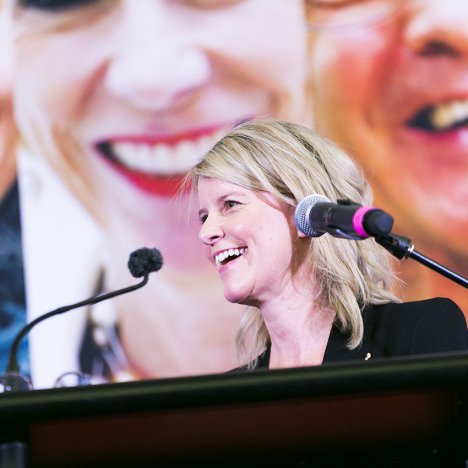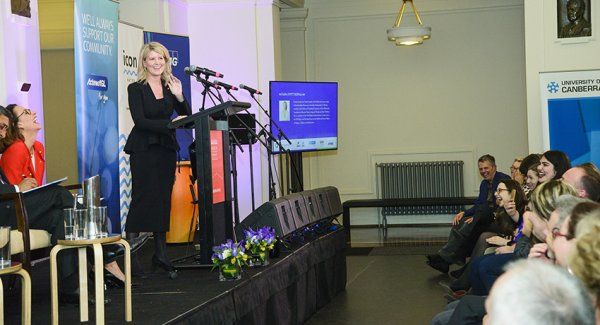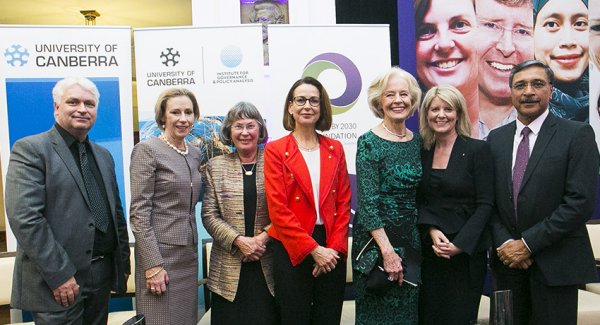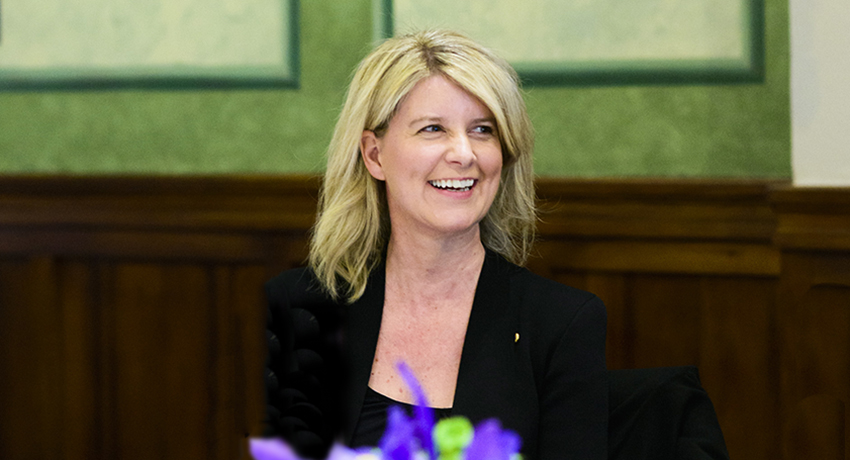Commencing her address to the audience by highlighting the combined achievements of the Foundation’s Advisory Council, Natasha Stott Despoja AM playfully congratulated Foundation Director Virginia Haussegger AM for bringing together a ‘special group of over-achievers’. She stated that the 50/50 by 2030 Foundation is ‘an idea who’s time has come, or maybe it’s a bit overdue’.
The 50/50 by 2030 Foundation is an idea who’s time has come.
Recalling her early forays into political life in 1995, when women made up only 14% of parliament, she recounted the tale of her first business lunch – during which she was asked if she entered politics to meet a husband.

50/50 by 2030 Foundation Advisory Council member Natasha Stott Despoja addresses the audience.
Stott Despoja declared her shock that in the 22 years since she entered parliament, the proportion of women’s participation in our national parliament would see Australia slide down the global rankings. She shared her frustration that even in the early 2000s women were – and are – still judged on their appearance, their parental and marital status, and that we as a society would still be talking about merit.
‘Who has ever advocated that women – or men – should enter boards or parliament on any thing but merit? But a meritorious institution is not one that reflects only one slice of the population’.
A meritorious institution is not one that reflects only one slice of the population.
Natasha then offered three reflections from her time as Ambassador for Women and Girls. Firstly she offered the following statistic: if every country matched the progress toward gender parity of its fastest-moving regional neighbour, global GDP would increase by US$12 trillion.
Realising this potential begins with full and equal access to education for girls, she said. Therefore, ‘Education for girls is the great equaliser and we are obliged, regionally and domestically, to invest in it’.
Education for girls is the great equaliser and we are obliged, regionally and domestically, to invest in it.
Secondly, the most heinous manifestation of gender inequality in the world is violence against women. ‘Gender inequality is at the core of the problem. Gender equality is the heart of the solution’, Stott Despoja declared. She reminded the audience that there is a proven connection between the elimination of violence and women in leadership positions.

“All protocols observed”. Stott Despoja commences her speech on a light note in her acknowledgement of the numerous distinguished guests in attendance.
The third reflection she offered was that society and the status of women will not change until women are represented – until they’re in leadership positions, and in our powerful institutions. Because apart from being ‘the fair and the right thing to do’, we know that women’s participation has a positive economic effect.
Gender inequality is at the core of the problem. Gender equality is the heart of the solution.
Conversely, Natasha argued, decreasing women’s representation in parliament by just 5% means that a country is 5 times more likely to use military intervention in order to resolve conflicts.
Research tells us that having more women in leadership positions changes public perceptions regarding the roles and aspirations of girls. Additionally, it results in more girls attending school and feeling more equipped to participate in leadership positions.

Following the formal proceedings, Natasha Stott Despoja (second from right) poses with (L to R): Professor Mark Evans, Adjunct Professor Carmel Mcgregor PSM, Emeritus Professor Meredith Edwards AM, Adjunct Professor Virginia Haussegger AM, Dame Quentin Bryce AD CVO, and University of Canberra Vice-Chancellor Professor Deep Saini.
Reiterating the saying that ‘you can’t be what you can’t see’, she commended the 50/50 by 2030 Foundation for providing a goal and a target to work towards.
In finishing, she declared ‘let’s not be afraid to try and beat that goal, and beat that target, because the women of Australia, of our region and the world deserve no less’.




